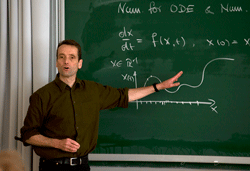The core offering of the BMS Phase I Program consists of Core Courses, which are offered at least once a year. The Core Courses include a two-semester or three-semester sequence in each of the eight Research Training Areas. These courses, whose content is fixed, are state-of-the-art introductions to knowledge and research in the respective areas, stressing interdisciplinary and transdisciplinary connections and applications, modern trends and current questions. Their aim is to provide solid foundations in the field, geared towards ambitious students headed into mathematical research.
 The topics of the Core Courses cover a broad range of both pure and applied mathematics, but they also reflect the particular strengths and interests of mathematics in Berlin.
The topics of the Core Courses cover a broad range of both pure and applied mathematics, but they also reflect the particular strengths and interests of mathematics in Berlin.
Each BMS Core Course meets for four hours per week for lectures plus an additional two hours per week for a tutorial session devoted to problem solving. Students are required to pass a final exam (oral or written) at the end of each semester course; the exam is designed to demonstrate the student's mastery of the contents of the course at a level that is appropriate for active research.
Each BMS Core Course has well-defined contents, as listed in each of the Research Training Areas, specifying the knowledge and skills that any student pursuing advanced work in the corresponding area should have.
Area 1: Geometry and topology
Differential geometry, algebraic topology and mathematical physics
Area 2: Algebraic geometry and number theory
Algebraic geometry, arithmetic geometry and number theory
Area 3: Stochastics and mathematical finance
Probability, statistics and stochastic analysis
Area 4: Discrete mathematics and optimization
Combinatorics, graph theory, discrete optimization and algorithms, complexity
Area 5: Discrete geometry
Discrete geometry, discrete differential geometry and visualization
Area 6: Numerical mathematics
Numerical analysis, continuous optimization and scientific computing
Area 7: Applied analysis
Modelling, Analysis and Optimization with Differential Equations
Area 8: Mathematics for AI
Mathematics of data science and AI





















